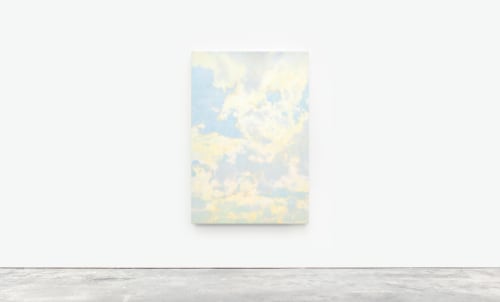
Martine Poppe’s Pixelated Skyscapes Are Reminders of Our World’s Fragile Climate
Tomas Weber
Oct 28, 2021 12:34pm
Martine Poppe’s paintings, at once meditative and grandiose, depict the fragile, fleeting qualities of light as it works its way across a drama of clouds and open sky. In Poppe’s latest solo show, “A Piece of Me,” at Kristin Hjellegjerde Gallery in London, all but two of her works are cloudscapes. Recalling the paintings of J.M.W. Turner and John Constable, Poppe’s sunbleached clouds—rendered in a pale and understated palette—dissolve into a luminous atmosphere, unifying form and light. Now, at a time of ecological crisis and hyperconnectivity, these skyscapes also become markers of environmental anxiety.
Born in Norway in 1988 to a photographer mother and a sailmaker father, Poppe views photography as central to her practice; it is, for the painter, a form of sketching. In a nod to her parents, Poppe prints large-scale digital images of her own photographs and covers them with translucent sailcloth, upon which she applies oil paint in rapid, regular strokes. The resulting paintings carry the effects of diffracted light and overexposed photography, as well as the pixelation of blown-up digital images. But the ultimate success of these works comes from the way they unsettle the viewer.
We know the photographs were taken from a specific point on Earth, but we cannot know from where, or even which angle. It is unclear where the viewer is positioned in relation to the images we see, and this disorientation offers an experience of vertigo, of floating, making it impossible for us to imagine occupying a stable position. The gaseous forms become inextricable from our own moods and pressures.
That we do not exist outside of the atmosphere, outside of climate and weather, is of course an urgent truth. Poppe’s delicate, pixelated clouds contemplate our embeddedness within interconnected systems—the climate and the internet. Through Poppe’s highly physical markmaking, the paintings seem to ask us to inhabit those systems with greater care and attention to the earth-spanning consequences of our actions.